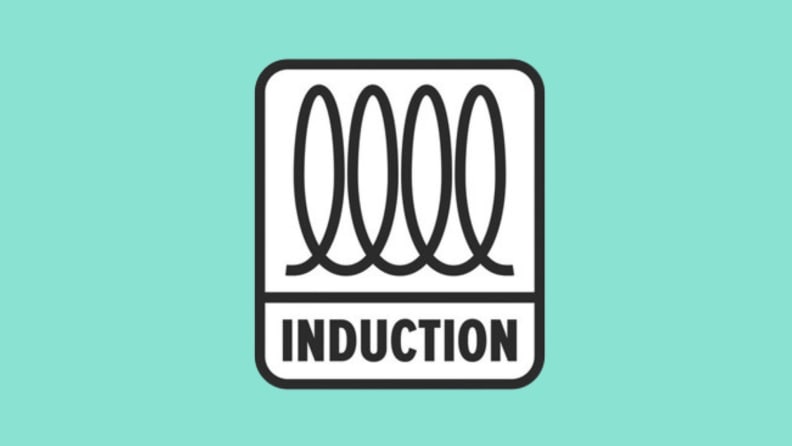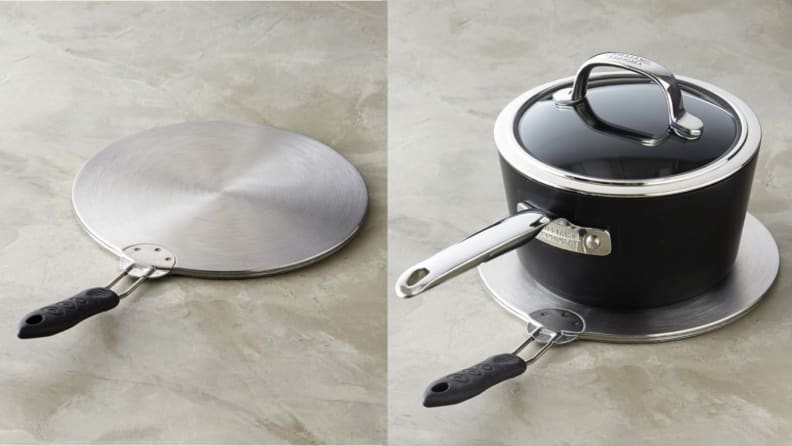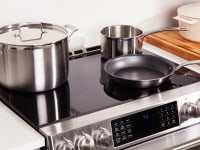Will my pots and pans work with induction?
From stainless to cast iron to ceramic, everything works with induction—if you know how.
Products are chosen independently by our editors. Purchases made through our links may earn us a commission.
Induction is faster, safer, and far more efficient than gas or electric cooking. So why isn't it more popular in the U.S.?
There are at least a few factors. First, open flames have a captive hold on the imagination of many home chefs, evoking professional kitchens. Secondly, most people just don't know about induction (we have a great induction FAQ, by the way).
Those that do have one perennial question: Do I need special cookware?
What cookware works with induction?
The good news is that a lot of the pots and pans you have probably work already, and there's an easy way to check.
Induction cooktops work by exciting the iron atoms in your cookware. Hence, iron needs to be present in sufficient amounts in your cookware. Most stainless steel should work just fine. If you're not sure, hold a magnet up to the bottom of the pan. If it sticks well, it will work on induction.
Our own experts' recommendations for pots and pans reflect the issues you may experience. Our top-rated cookware set and our top pick for best stainless steel skillet are both perfectly compatible with induction.
But our top-rated nonstick pan is aluminum and won't work with induction. Womp-womp. (Fortunately, our pick for the best ceramic nonstick pan) works just fine.)
Read on to find out what works, what doesn't, and how you can tell the difference. (Or check out our list of the best cookware sets for induction).
Look for the "works with induction" symbol

Look for this symbol on your cookware to easily find out whether it's induction-compatible.
The first thing you should do is check the underside of your cookware. Some cookware manufacturers stamp or print this little looping induction logo right on the pan. When you're shopping for new cookware, this logo is usually on the box.
If there's no logo, then revert to the "check it with a magnet" trick.
Cookware that ALWAYS works with induction
While there are plenty of finer points to consider when shopping for induction cookware, there are a few clear rules.
Here's a big one: Cast-iron cookware will always work with induction, 100% of the time. Your skillets and Dutch ovens may be big, heavy bruisers, but their all-iron composition guarantees magnetic cooking compatibility.
The only downside? Cast iron can easily scratch the glass surfaces common to induction cooktops. To keep your glass looking pristine, you can just cook with something thin between the burner and the surface.
We've heard of people using paper towels, newspaper, parchment paper, and even silpat mats. Since induction uses magnetic fields, the cooking surface itself doesn't get hot and the paper won't burn, allowing you to keep your cooktop scratch- and splatter-free.
(Of course, the pan itself does get hot. While we haven't heard of paper spontaneously combusting during induction cooking, you should remain vigilant if you choose to use it.)
Carbon steel cookware—basically just a lighter kind of cast iron—also works with induction cooktops. Then there's enameled cast iron cookware (also called "enamelware"), which also plays nicely, as does graniteware (made of steel, despite its name).
If you already own one or more of these kinds of cookware, double check them with a magnet, but you should be in the clear—go ahead and upgrade to induction! But if you're cooking with a lot of stainless steel or aluminum pans, keep reading.
Cookware that might NOT work with induction—including some stainless
On the face of it, stainless should work just fine with induction. Steel is magnetic, right? Well, yes and no. As it turns out, there are multiple types of stainless steel. Scientific American has a great explainer on what makes stainless steel magnetic, but the short answer is that it depends on what the alloy is made of. If it's made with iron, then it's magnetic; if it's made with nickel, it's non-magnetic.
In order to be sure, check your existing cookware with a magnet.
Most aluminum cookware will not work, since aluminum doesn't include any iron-based compounds. However, some aluminum pots and pans feature an iron core, which should mean they'll work with induction. Sadly, even then it's not a given. If the iron plates in your aluminum cookware aren't large enough, they still won't work. You'll likely need to try all your iron-core aluminum cookware on a case-by-case basis to find out what works and what doesn't.
Most copper and ceramic cookware won't work either, unless the base of the cookware is iron or steel. Again, try it with a magnet.
Woks and induction cooktops
There's one other issue you might run into: cookware with rounded bottoms, like woks. Since physical contact with the cooking surface isn't strictly required, these may still work, but a flat bottom does provide the best transfer of electromagnetic energy.
If you want to get the absolute best performance with a wok on induction, you'll need to either invest in a wok that has a flatter bottom. Our top pick from HexClad is induction compatible and has a decently flat surface that will do the trick.
When all else fails, use an induction disk

If you have a piece of incompatible cookware you love but you really want an induction cooktop, an induction interface disk is a simple solution.
If you've exhausted all of these tips and tricks, still want an induction cooktop, but don't want to buy all new cookware, there's one simple option: an induction disk.
These metal plates sit on top of your cooktop and act as DIY burners that will heat up, transferring heat indirectly to your non-magnetic pots and pans. Yes, it kind of defeats the purpose of induction, but it works!
More on cookware
- Best Cookware Sets We've Tested
- The Best Cookware Sets We've Tested for Induction
- The Best Stainless Steel Cookware Sets We've Tested
- The Best Budget Cookware Sets We've Tested
- GreenPan Premiere frying pan review
- Made In Cookware Review
- Our Place Always Pan 2.0 Review
- How to choose just the right cookware set
- The Best Nonstick Cookware Sets We've Tested
- The Best Camping Cookware We've Tested
- The All-Clad G5 Graphite Core Cookware Review
Still have questions? See our entire Induction 101 series and get answers.



